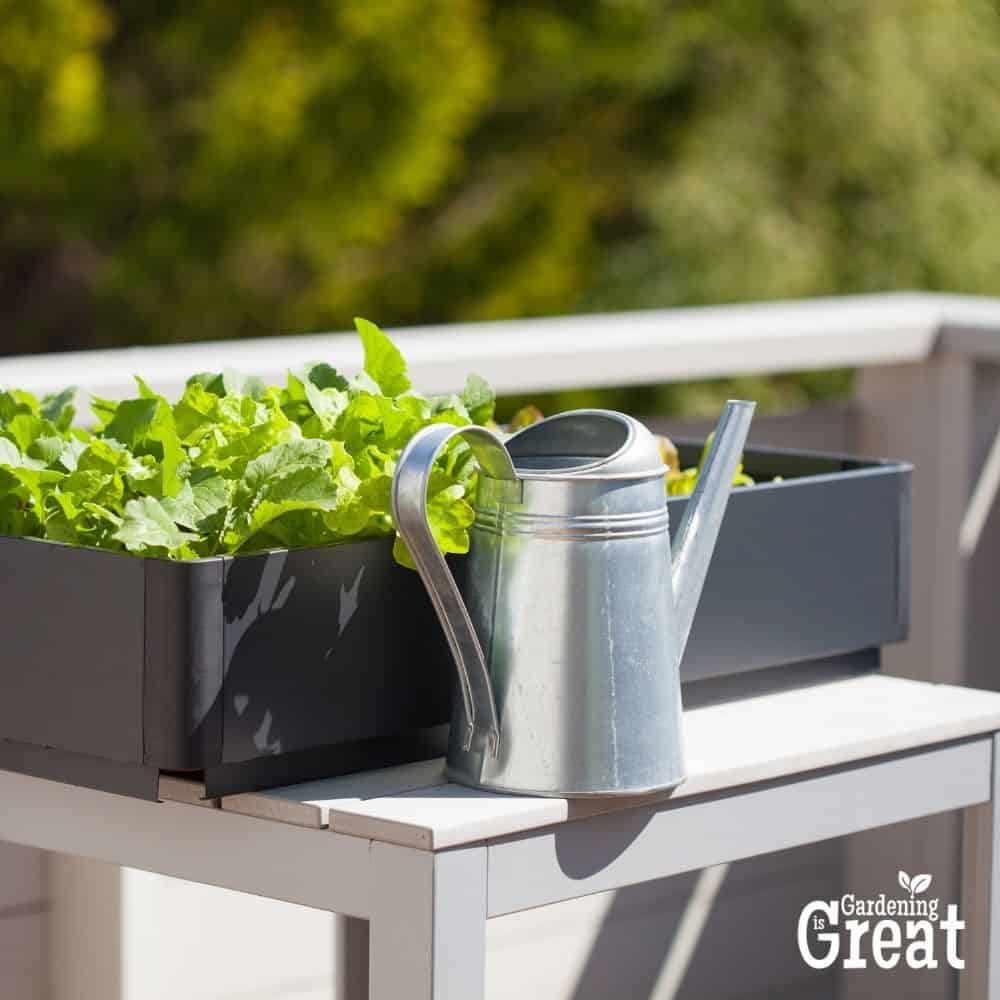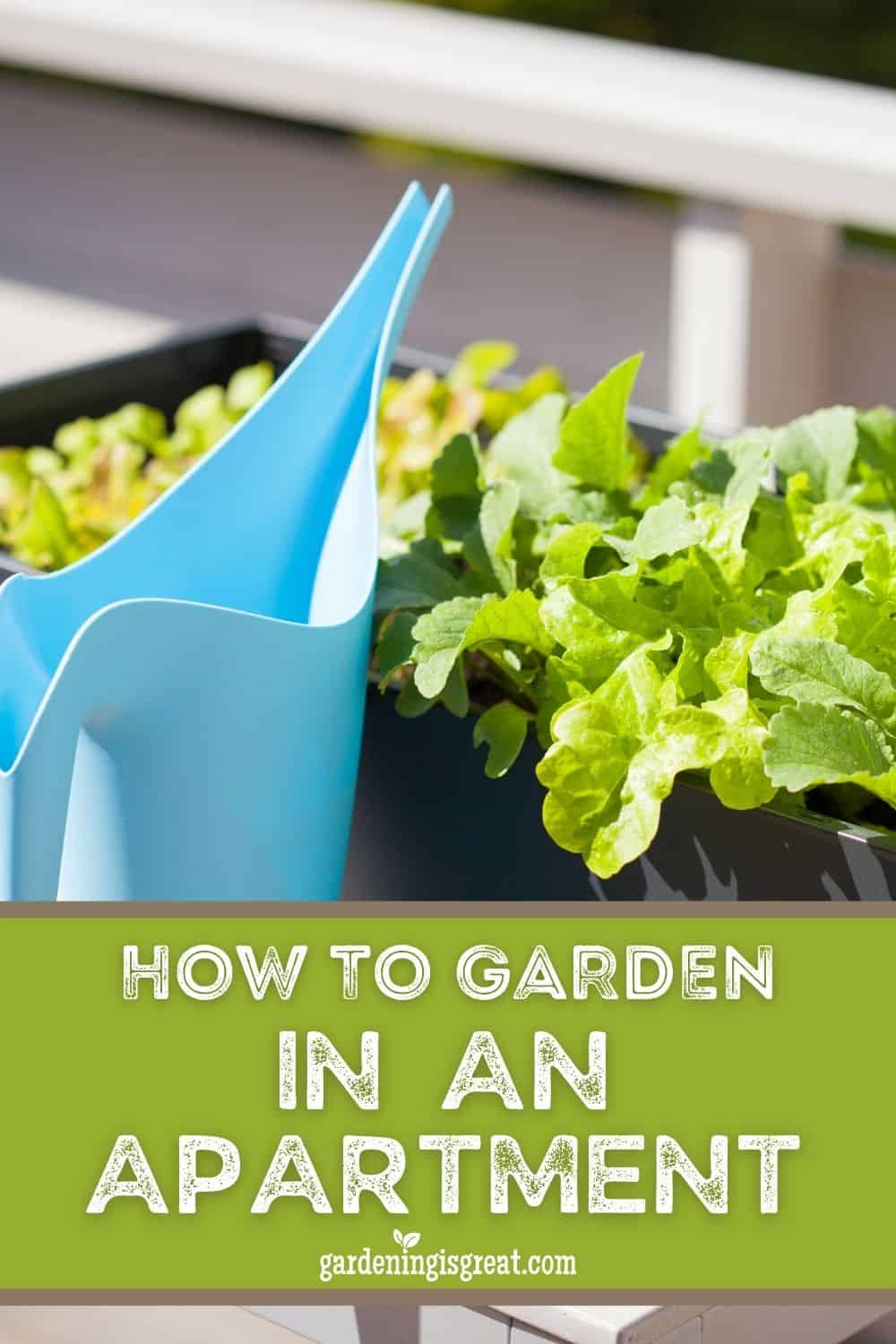How to Garden for Condo & Apartment Owners
The lack of personal grassy space should never deter renters and condo owners from having their own garden oasis – although oftentimes, it does.
In this article, we will show you how to work around your condo and apartment limitations to create and maintain your very first floral retreat.

This post contains affiliate links that earn me a commission at no additional cost to you.
The Best Garden Option For Condo & Apartment Owners
If you’re tight on space (and funds) and looking for a way to get as much bang for your buck as possible in terms of plant variety, then container gardening vs. traditional pots and hangers may be for you!
Container Gardening
Essentially container gardening is a rectangular or oval unit that can house various plants indoors (or outdoors) for long periods. Containers can be made out of metal, plastic, ceramic, and more and can be stackable if you are limited in space.
How Does Container Gardening Work?
Container Gardens work by having a drainage system in the lower portion of the container, topped with soil, potting mix (sometimes a mix of both), and a watering system.
As the plants grow, you have the option of placing them in a larger container or trimming the plant down to stay within the limits of its shared space.
What Type Of Container Garden Can I Create In My Condo Or Apartment?
The fun part about container gardening is that there are multiple types of plants that can survive in a container setting. You have the option of creating the following types of systems with relative ease inside or outside your home:
- Vegetable Garden
- Herb Garden
- Fruit Garden
- Bulb Garden
- Flowering Vines Garden
- Geranium Gardens
Is Container Gardening Low Maintenance?
Depending on which type of garden you choose to create, you can make it as simple or as intricate as you want it to be.
Herb gardens are considered low maintenance as many herbs only need to be placed in water to survive and grow, whereas vegetable and fruit gardens require continuous pruning, trimming, PH, and insect checks that may overwhelm someone with an extremely hectic schedule.
What Do I Need To Create A Container Garden For A Condo or Apartment?
If you are considering bringing fresh greenery to your living space, you will need the following tools and equipment purposeful for both indoor and outdoor gardens.
- Deep bottom containers
- Soil or Potting Mix
- Fertilizer
- Lighting
- Watering Can
- Spray Bottle
- Hand Cultivator, Trowel, and Pruning Shears
- Soil Moisture Meter
- Neem Oil
- Fungicide, Pesticides
- Plant Trellis (for vine plants)
What Are The Limitations of Community Living For New Gardeners?
As fun and exciting as close-quarter living can be, when it comes to making your space your own, you can come across some mind-numbing obstacles.
From tightened leasing restrictions to severely allergic roommates, renters can quickly become overwhelmed with the process of starting a garden.
However, before beginning to plan out a strategy to overcome this, here’s a list of common obstacles to be aware of from the very start:
HOA/Leasing Restrictions
Nothing can set your blood to boil than a courtesy letter from your HOA or On-Site leasing office, citing a code violation they noticed (with an attached notice of payment).
We advise before buying the first flowerpot to obtain an updated copy of the property by-laws, just so that there’s no trouble further down the road.
Lack of Space
Whether you are in a comfortable 1200 sq ft loft or sharing a room with three others in a tiny flat, knowing the space you have to work with is ideal for keeping the peace—ditto for outdoor areas.
Measuring overestimation is the name of the game, as a plant can go from 5″ to 20″ in a matter of months- now lingering into your neighbor’s territory. This leads us to our next obstacle…
Neighbors and Roommates
Especially true in inner-city and highly dense suburbia areas, your neighbors and roommates play an essential role in the creation of your garden oasis.
Whether you’re dealing with severe allergies or interesting neighbors, survey the idea with those who will be directly impacted to avoid hard feelings when things get a little messy- and trust me, it can, oh it can.
Natural Resources
Although communities are now adopting a more “organic” design and decorating pattern, quartered living can still be a never-ending sight of concrete slabs, faux grass mats, and adorned shrubbery.
Things such as forced air systems and water quality play a major role in your plants’ development and longevity and need to be planned carefully.
Proper Sunlight
This is an honorable mention as it is usually the first thing advised of new plant owners but discussed in a way that may not suit the needs of strict living dwellers.
Home and landowners may have options such as cutting tree limbs, adding additional lighting units, and making adjustments as needed that condo and apartment owners may not have access to. This must be taken into consideration at the planning stages of your garden.
Helpful Tips To Know For Condo And Apartment Container Gardeners
1. When selecting the type of container to use for your garden, we suggest either metal or clay over plastic containers. This is because plastic containers are easily breakable and stores heat which can dry out your potting soil.
2. If you choose to create an indoor garden but want a tight streamlined space- try aquarium containers gardening! Already suited for a variety of aquatic habitats, aquariums can sub as a system to properly grow fruits, vegetables, and even herbs.
3. Keep high humidity plants 1-2 feet away from walls and corners to prevent wall paint from peeling from moisture.
4. Before purchasing your plants, double-check to make sure they will not produce a toxic environment for you, co-inhabitants, and even pets (and vice versa).
5. Make sure you are repotting your plants every 6-7 months to keep the soil fresh and root rot.
6. If creating a garden outdoor, make sure you read the property by-laws prior to beginning to make sure you’re allowed to have the oasis you are wanting to create.
Community living does not mean you cannot enjoy the pleasures of gardening! Whether fruits or geraniums, developing your system can reap many health and wellness benefits.


